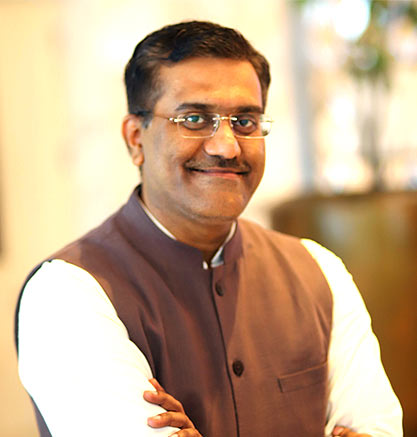-
CENTRES
Progammes & Centres
Location
India and Estonia, leading digital nations, are exploring a strategic cybersecurity partnership. Success will depend on India balancing its diplomatic relations while advancing its national interests.

In an increasingly interconnected world, technology and cybersecurity cooperation have emerged as central concerns for nations worldwide. India, the world’s largest digital democracy and a leader in the Information Technology sector, has made significant strides in fortifying its digital infrastructure and securing its cyberspace. Estonia, one of the world’s most digitally advanced countries, has seen this success and now seeks to collaborate with India.
However, forging such a partnership is not without its challenges and will require New Delhi to walk a diplomatic tightrope. Estonia, a former Soviet state, is a member of the North Atlantic Treaty Organization (NATO) and a supplier of critical defence equipment to Ukraine in the Ukraine-Russia war. India, meanwhile, has steadfastly defended its strategic autonomy—maintaining close ties with the United States (US) while refusing to criticise Russia for its military aggression in Ukraine. Yet, forging such a collaboration not only promises to improve India’s technology capabilities, but also strengthen its position as a pivotal player in the global cybersecurity landscape.
The year 2023 witnessed an alarming surge in Distributed Denial-of-Service (DDoS) attacks, with Estonia experiencing a staggering 484 incidents—182 more than the previous year. These attacks were aimed to cripple critical national infrastructure and services by flooding servers with excessive requests. In one of the major cyber incidents, the Estonian ticketing platform Ridango was targeted by a DDoS attack that disrupted the state-owned Elron train service’s ticket sales system for nearly a day. As per the Estonian Information System Authority, a pro-Russia hacker group was behind the attack.
The year 2023 witnessed an alarming surge in Distributed Denial-of-Service (DDoS) attacks, with Estonia experiencing a staggering 484 incidents—182 more than the previous year.
Over the last two decades, Estonia has faced several attacks from Russian hackers targeting its cyberspace. In one of the earliest such attacks, Russian hackers, in a particularly debilitating breach in 2007, targeted several Estonian websites belonging to the government, political parties, news organisations, and banks. The wave of attacks followed the dispute between Russia and Estonia over the relocation of a World War II-era statue in the Estonian capital, Tallinn. Over the years, such attacks have continued. In recent years, ransomware attacks have emerged as another significant challenge that has affected a wide range of industries, from healthcare to manufacturing.
Exacerbating the cyber threats faced by Estonia has been its staunch stance against Russia over the Ukraine conflict. Estonian leaders have time and again warned that once Ukraine is captured, Russia will turn its attention towards the Baltics, looking to bring countries like Estonia back under Moscow’s control. To stave off that eventuality, the Estonian government has poured money and weapons into Ukraine’s war effort, donating more than 1 percent of its GDP to Kyiv. It has, until now, provided Ukraine with nearly €500 million in military aid and, last year, Tallinn announced various tranches of defence support, including infantry firearms and D-30 towed howitzers. It has also strictly complied with political and economic sanctions imposed by the European Union (EU) against Moscow.
In addition, Estonia has taken measures to strengthen its resilience against Russia’s cyber-enabled disinformation and propaganda tactics. The Russian tactics include fostering anti-government sentiments among the Russian-speaking community in Estonia and spreading anti-vaccination narratives on social media platforms. To counter this, Tallinn has taken several steps, including banning the broadcasting of Russian TV channels and expanding domestic media literacy programmes. As a result, the country has one of the highest media literacy levels in the EU.
In addition, Estonia has taken measures to strengthen its resilience against Russia’s cyber-enabled disinformation and propaganda tactics.
The already discordant relationship with Russia is only heading south as Estonia considers sending troops to Ukraine, while Russia has put Estonian Prime Minister Kaja Kallas on a wanted list for the removal of Soviet-era monuments dedicated to Soviet soldiers. Amidst all this, the Estonian economy is expected to remain in recession in 2024 due to weak export prospects and declining investment. As a result, Tallinn is actively seeking new partners who are both rapidly growing and relevant today.
As the world’s largest digitally connected democracy with 830 million Internet users, India has implemented several digital initiatives, including one of the world’s largest real-time digital payment systems powered by the Unified Payments Interface. These have been instrumental in reshaping India into a digitally empowered society and a major force in the global digital economy. Simultaneously, however, India has also faced cyber threats such as attacks against critical national infrastructure, attacks targeting the financial sector, cyber-enabled espionage, and of late ransomware attacks, etc. The nature of these threats is similar to those faced by Estonia. However, the sources of these threats are different—China and Pakistan and the hacking syndicates backed by them.
As the world’s largest digitally connected democracy with 830 million Internet users, India has implemented several digital initiatives, including one of the world’s largest real-time digital payment systems powered by the Unified Payments Interface.
As part of building cyber resilience, besides implementing several measures domestically, India has also fostered international cooperation on technology and cybersecurity issues. Leveraging its growing global influence, New Delhi has facilitated dialogues and expert working group discussions with like-minded partners at the bilateral and minilateral levels, such as the Quad. In building these partnerships, India has maintained its principle of strategic autonomy, refusing to be part of the US-led Western or China and Russia-led Eastern blocs in cyberspace. Thus, India’s balanced approach to international relations, coupled with its growing digital prowess, makes it an indispensable partner in the complex landscape of global cybersecurity. India is viewed as a promising democratic partner in polarised cyberspace.
This is why Estonia too seeks to collaborate with India on cybersecurity matters. Estonian officials have expressed keen interest in deepening ties with India in several domains. These include:
Knowledge exchange: Sharing expertise, best practices, and innovative approaches to cybersecurity;
Research collaboration: Joint research initiatives to develop new cybersecurity technologies and strategies;
Training programmes: Mutual training efforts to enhance the skills of cybersecurity professionals in both countries;
Joint exercises: Participation in cybersecurity exercises, including NATO-run events, to improve practical capabilities;
Private sector engagement: Involving businesses from both countries to drive innovation and create economic opportunities;
Digital services and education systems: Exploring collaborative efforts in these sectors to leverage each country’s strengths.
In addition, Tallinn’s experience in tackling disinformation and ‘fake news’ can prove beneficial to India as it tackles the anti-India propaganda from Pakistan and China.
This collaboration offers mutual benefits. For Estonia, it will offer access to India’s vast digital ecosystem, technology expertise, and cybersecurity capabilities. For India, it will provide an opportunity to gain exposure to NATO-level practices and potentially expand its influence in shaping the EU’s perceptions on cyber issues.
If India’s recent strategic diplomacy is any guide, this partnership with Estonia holds significant promise, provided Tallinn can convincingly demonstrate the value of this complex collaboration. New Delhi has consistently sought to build robust international collaborations, and this opportunity to engage with a NATO member on pivotal cyber issues is both unique and unprecedented. By seizing this collaboration, India can not only solidify its role as a leading force in the digital realm but also drive global innovation and shape best practices for cyber resilience. However, the success of this partnership will hinge on India’s ability to advance its national interests while deftly maintaining the delicate balance of its diplomatic relations.
Sameer Patil is a Senior Fellow at the Observer Research Foundation.
Aneesh Parnerkar is a Research Intern at the Observer Research Foundation.
The views expressed above belong to the author(s). ORF research and analyses now available on Telegram! Click here to access our curated content — blogs, longforms and interviews.

Dr Sameer Patil is Director, Centre for Security, Strategy and Technology at the Observer Research Foundation. His work focuses on the intersection of technology and national ...
Read More +
Aneesh Parnerkar is a Research intern with the Observer Research Foundation. ...
Read More +